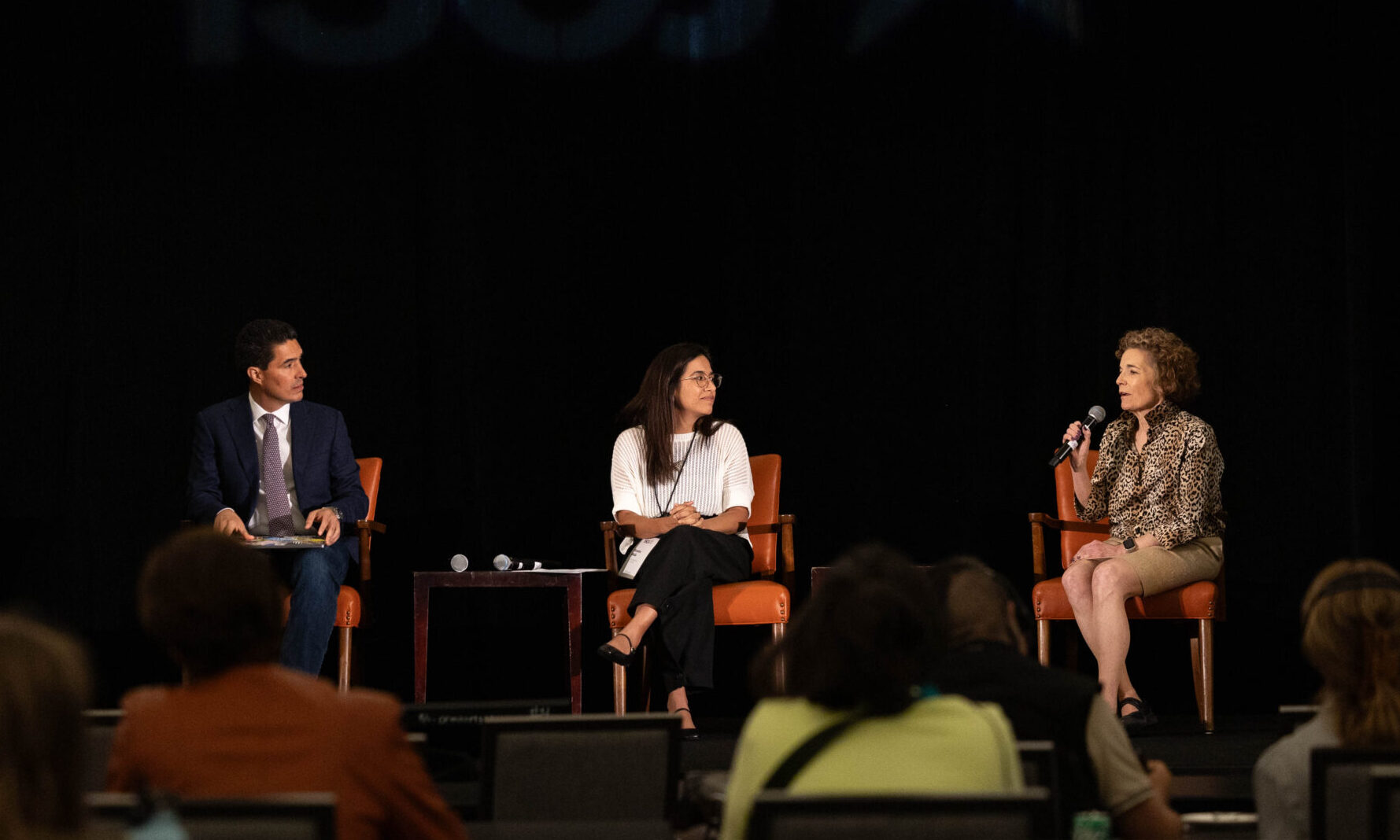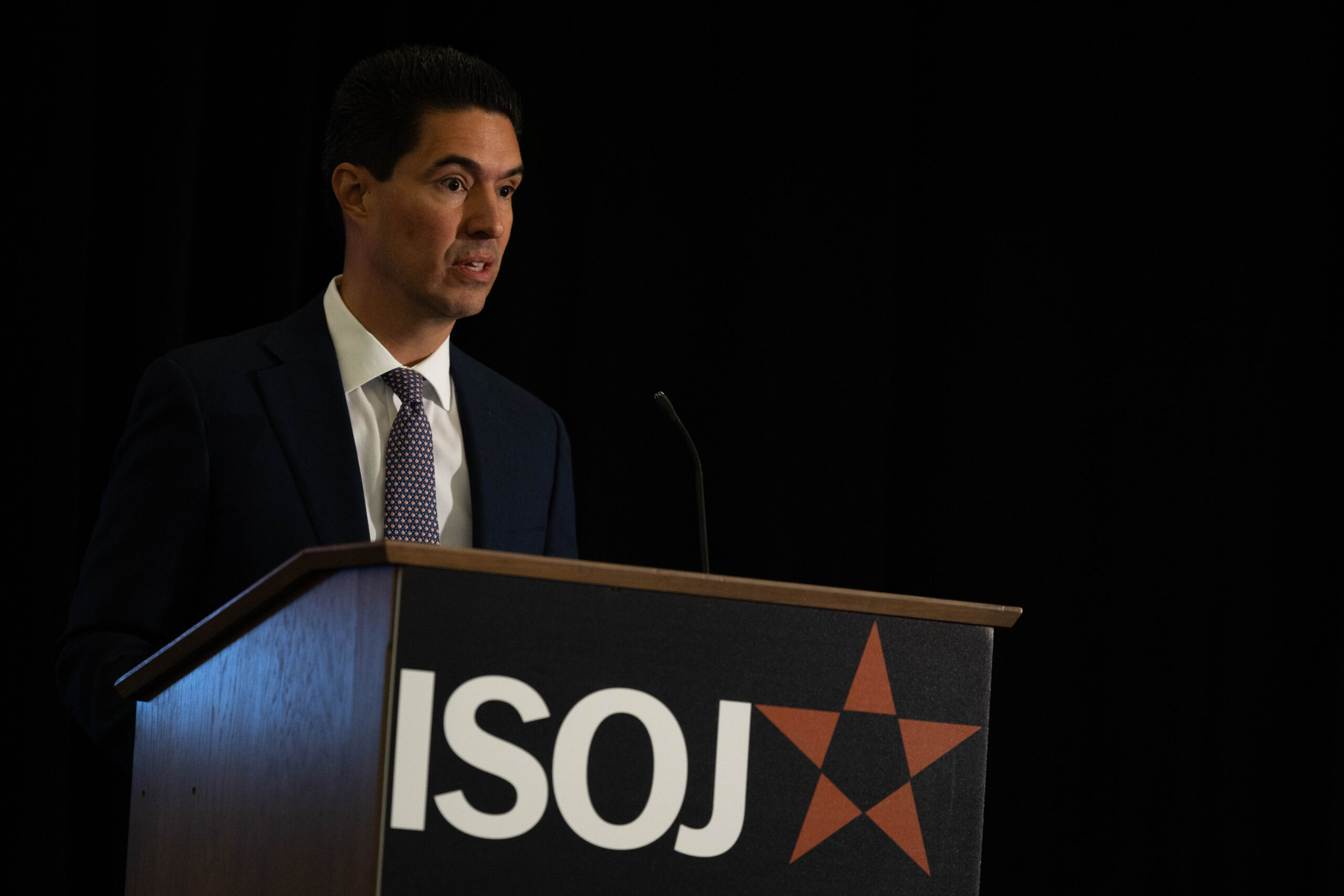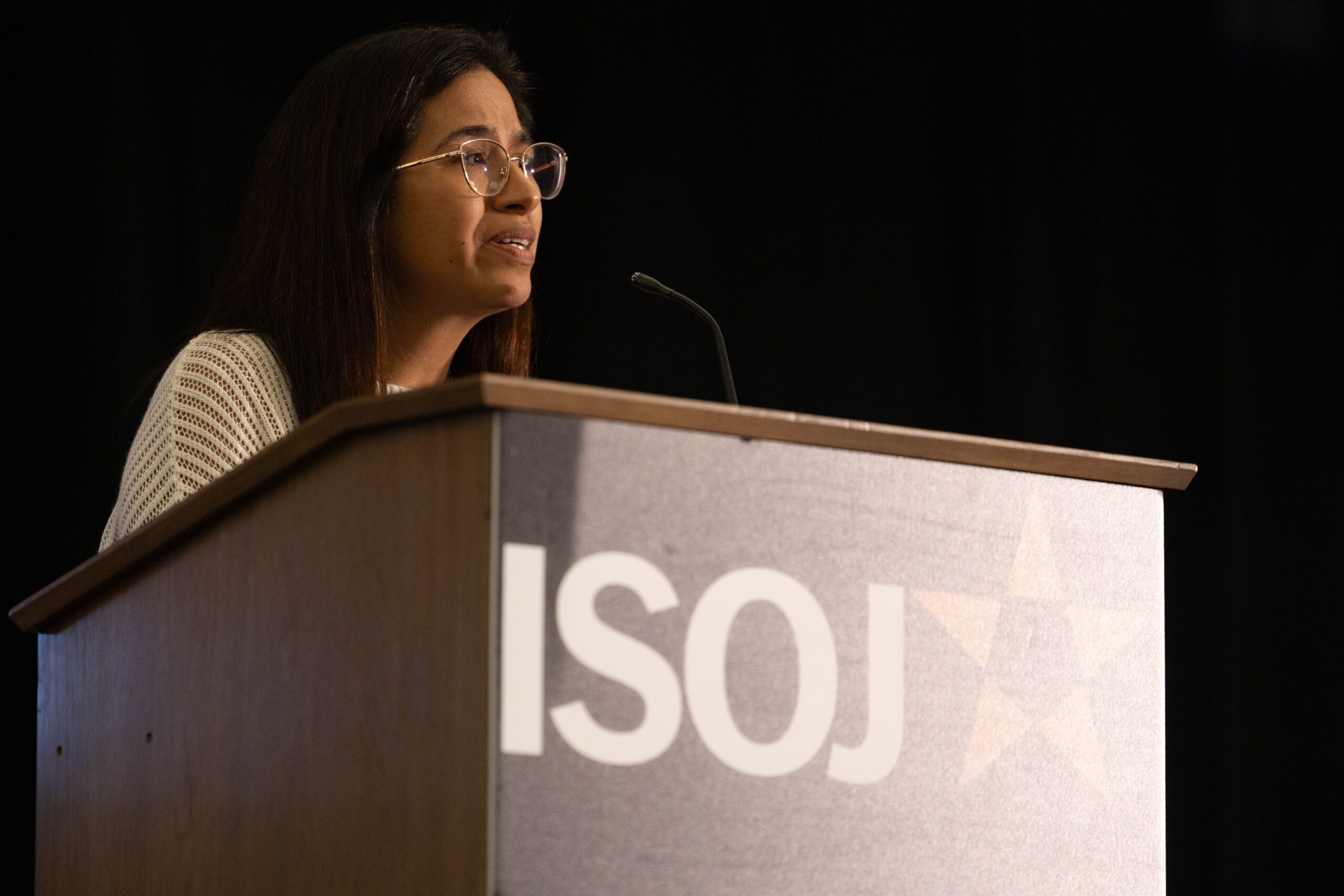José Rubén Zamora, founder of Guatemalan newspaper elPeriódico, has spent more than 600 days in prison under pretrial detention. He remains there despite the fact that international organizations have pointed to violations of human rights and international law in his case.
Gustavo Gorriti, founder of Peruvian investigative outlet IDL-Reporteros, faces an investigation from prosecutors who have ordered him to turn over source phone numbers. Additionally, he is defamed by far-right groups who dump trash, excrement and firecrackers at his newsroom.

To close the 25th ISOJ, journalist José Zamora (left) and journalist Romina Mella (center) were joined by Kathy Kiely, Lee Hills Chair in Free-Press Studies at the Missouri School of Journalism (right). (Patricia Lim/Knight Center)
Both men have won numerous awards for their work to expose corruption and abuse in their respective countries, and many see these legal cases as retaliation for this.
To close the 25th International Symposium on Online Journalism (ISOJ), Zamora’s son, José Zamora, and Gorriti’s colleague, Romina Mella, called on the international community for support. They were joined by Kathy Kiely, Lee Hills Chair in Free-Press Studies at the Missouri School of Journalism.
“It’s an honor to close this program out – this wonderful conference – with two people who I think really remind us why we’re here,” Kiely said. “This is a situation where the investigators have become the investigated. And I think it’s really important for us to show our support.”
“624 days of solitary confinement for practicing journalism. That is the case of my father, Guatemalan journalist José Rubén Zamora. 624 days being arbitrarily detained for denouncing corruption at the highest levels of the Guatemalan government under the administration of former President Alejandro Giammattei,” said José Zamora, chief communications and impact officer at EXILE.
While he spoke, a single image appeared on screen: his father, in a suit and medical mask, surrounded by armed and masked security forces that appear to carry riot gear.
“My father views his imprisonment as an extension of his journalistic duty to expose the abuse of power,” he explained.
As José Zamora recounted, it was not the first time that his father and team were attacked. He listed defamation campaigns, fiscal terrorism, death threats, drive-by shootings, kidnappings and an assassination attempt.
Still, he described this current imprisonment as “the most challenging” part.
“The manipulation of criminal law to silence journalists has become a favorite tactic of repressive regimes,” he said, adding that elPeriódico was forced to close and many journalists have gone into exile.
Considering that his father is still in pretrial detention, José Zamora said it reveals “how the Judiciary and the Office of the Attorney General are still being run by corrupt forces.”

José Zamora thanked journalists around the world who are reporting on his father's case and on what is happening in Guatemala. (Patricia Lim/Knight Center)
On behalf of his father, team and family, José Zamora thanked Guatemalan journalists who are continuing their jobs, as well as journalists around the world who are reporting on his case and on what is happening in Guatemala.
“These 624 days have revealed both the worst and the best of humanity, the cruelty of repression and the strength of solidarity,” he said, saying that one day, they hope to return the support they have been given.
Kiely pointed out the similarity between the situations of José Rubén Zamora and Gorriti.
“This is really a page out of the dictator’s handbook,” Kiely said before introducing Mella, managing editor of IDL-Reporteros.
“Investigative journalists are under attack in my country, in Peru,” Mella said, highlighting aggressive disinformation campaigns against her outlet and Gorriti, its director, over the last year.
The disinformation campaigns are “promoted by a coalition of organizations, political parties and the protagonists of some of the most serious corruption cases in Peru’s recent history,” she said.
IDL-Reporteros and Gorriti have broken investigative stories related to corruption and bribery in Peru’s political class, namely those linked to Operation Car Wash, a multinational scandal involving Brazilian conglomerate Odebrecht.
“These disinformation campaigns were focused on presenting Gustavo as a kind of political operator who has supposedly managed and controlled the Attorney General’s office from the shadows,” Mella said, explaining that the alleged motive was to control Operation Car Wash investigations.
“It sounds absurd. It is absurd,” she said.
Mella said Gorriti was also accused of instigating – through journalism reporting – the suicide of former President Alan García who shot himself just as authorities went to arrest him for alleged involvement in Operation Car Wash.
“These lies, spread by disinformation in media and social networks, unleash waves of hatred by the far right,” she said.
These lies are used by those who have been most exposed by independent journalists, according to the reporter.
“It is an attack created by corruption circles against a journalist investigating them,” Mella said, pointing to similarities between what has happened in Guatemala.
“The objective is clear, turn researchers into research subjects, and politicians investigated for serious acts of corruption into politically persecuted individuals,” she said.
All of this happens alongside “systematic harassment and violence from far-right groups.”
In addition to assaults at their newsroom, the groups have gone to Gorriti’s house and have doxxed Mella on social media. This has been going on for six years and police have not acted, the journalist said.
On March 27, a Lima public prosecutor opened a preliminary investigation into Gorriti for alleged bribery.
“[The prosecutor] is examining whether Gorriti, in his stories for IDL-Reporteros, promoted the work of two public prosecutors in exchange for journalistic scoops about their investigations into political corruption, according to the judicial notification from the Attorney General’s office that was sent to Gorriti,” as reported by the Committee to Protect Journalists (CPJ).

Mella said that attacking investigative journalists means attacking the citizens’ right to be informed. (Patricia Lim/Knight Center)
Part of this case is the order that Gorrtiti turn over telephone numbers used between 2016 and 2021.
Gorriti said he will fight for journalists’ right to source confidentiality and will continue to expose corruption. He denies an improper relationship with public prosecutors.
“What we are going through now represents a serious threat to journalists and freedom in general,” Mella said. “Attacking investigative journalists means attacking the citizens’ right to be informed.”
She asked those in attendance to report on the case. On the screen behind her was a photo of Gorriti with a QR code that links to a letter of support for the investigative journalist.
“An attack against one is an attack against all,” she said. “From our newsroom in Lima, we will continue fighting.”